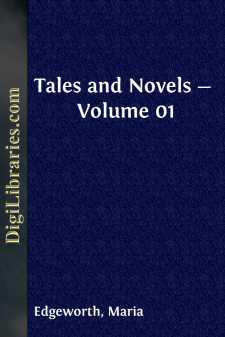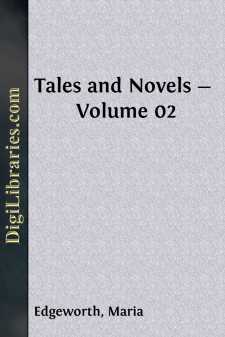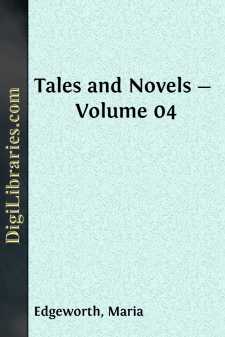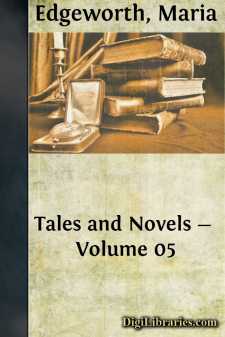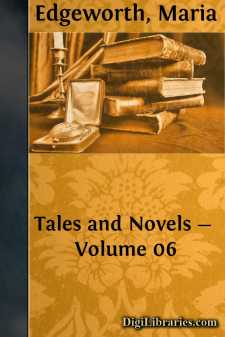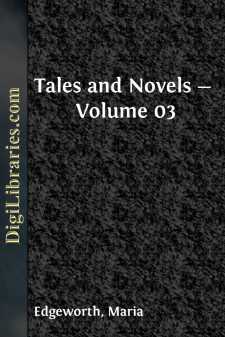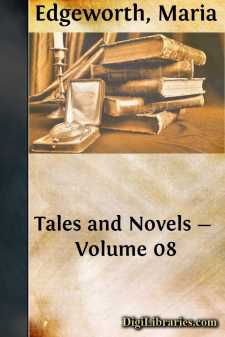Categories
- Antiques & Collectibles 13
- Architecture 36
- Art 48
- Bibles 22
- Biography & Autobiography 813
- Body, Mind & Spirit 142
- Business & Economics 28
- Children's Books 17
- Children's Fiction 14
- Computers 4
- Cooking 94
- Crafts & Hobbies 4
- Drama 346
- Education 46
- Family & Relationships 57
- Fiction 11829
- Games 19
- Gardening 17
- Health & Fitness 34
- History 1377
- House & Home 1
- Humor 147
- Juvenile Fiction 1873
- Juvenile Nonfiction 202
- Language Arts & Disciplines 88
- Law 16
- Literary Collections 686
- Literary Criticism 179
- Mathematics 13
- Medical 41
- Music 40
- Nature 179
- Non-Classifiable 1768
- Performing Arts 7
- Periodicals 1453
- Philosophy 64
- Photography 2
- Poetry 896
- Political Science 203
- Psychology 42
- Reference 154
- Religion 513
- Science 126
- Self-Help 84
- Social Science 81
- Sports & Recreation 34
- Study Aids 3
- Technology & Engineering 59
- Transportation 23
- Travel 463
- True Crime 29
Maria Edgeworth
Maria Edgeworth (1768–1849) was an Anglo-Irish novelist known for her pioneering work in children's literature and her keen social and political commentaries. Her notable works include "Castle Rackrent" (1800), a satirical novel often regarded as the first historical novel, and "Belinda" (1801), which challenged contemporary views on women's roles. Edgeworth's writing significantly influenced the development of the novel in the 19th century and provided critical insights into Irish society and British colonialism.
Author's Books:
Sort by:
by:
Maria Edgeworth
MARIA EDGEWORTH Rosamond, a little girl about seven years of age, was walking with her mother in the streets of London. As she passed along she looked in at the windows of several shops, and saw a great variety of different sorts of things, of which she did not know the use or even the names. She wished to stop to look at them, but there was a great number of people in the streets, and a great many...
more...
by:
Maria Edgeworth
THE BRACELETS. In a beautiful and retired part of England lived Mrs. Villars, a lady whose accurate understanding, benevolent heart, and steady temper, peculiarly fitted her for the most difficult, as well as most important of all occupations—the education of youth. This task she had undertaken; and twenty young persons were put under her care, with the perfect confidence of their parents. No young...
more...
by:
Maria Edgeworth
PREFACE. It has been somewhere said by Johnson, that merely to invent a story is no small effort of the human understanding. How much more difficult is it to construct stories suited to the early years of youth, and, at the same time, conformable to the complicate relations of modern society—fictions, that shall display examples of virtue, without initiating the young reader into the ways of...
more...
by:
Maria Edgeworth
CHAPTER I. Some years ago, a lad of the name of William Jervas, or, as he was called from his lameness, Lame Jervas, whose business it was to tend the horses in one of the Cornwall tin-mines, was missing. He was left one night in a little hut, at one end of the mine, where he always slept; but in the morning, he could no where be found; and this his sudden disappearance gave rise to a number of strange...
more...
by:
Maria Edgeworth
PREFACE The prevailing taste of the public for anecdote has been censured and ridiculed by critics who aspire to the character of superior wisdom; but if we consider it in a proper point of view, this taste is an incontestable proof of the good sense and profoundly philosophic temper of the present times. Of the numbers who study, or at least who read history, how few derive any advantage from their...
more...
by:
Maria Edgeworth
CHAPTER I. "And gave her words, where oily Flatt'ry lays The pleasing colours of the art of praise."—PARNELL. NOTE FROM MRS. BEAUMONT TO MISS WALSINGHAM. "I am more grieved than I can express, my dearest Miss Walsingham, by a cruel contre-temps, which must prevent my indulging myself in the long-promised and long-expected pleasure of being at your fête de famille on...
more...
by:
Maria Edgeworth
CHAPTER I. "Are you to be at Lady Clonbrony's gala next week?" said Lady Langdale to Mrs. Dareville, whilst they were waiting for their carriages in the crush-room of the opera-house. "Oh, yes! every body's to be there, I hear," replied Mrs. Dareville."Your ladyship, of course?" "Why, I don't know; if I possibly can. Lady Clonbrony makes it such a point with...
more...
by:
Maria Edgeworth
CHAPTER I. CHARACTERS. Mrs. Stanhope, a well-bred woman, accomplished in that branch of knowledge which is called the art of rising in the world, had, with but a small fortune, contrived to live in the highest company. She prided herself upon having established half a dozen nieces most happily, that is to say, upon having married them to men of fortunes far superior to their own. One niece still...
more...
by:
Maria Edgeworth
CHAPTER I. "There is Helen in the lime-walk," said Mrs. Collingwood to her husband, as she looked out of the window. The slight figure of a young person in deep mourning appeared between the trees,—"How slowly she walks! She looks very unhappy!" "Yes," said Mr. Collingwood, with a sigh, "she is young to know sorrow, and to struggle with difficulties to which she is quite...
more...
by:
Maria Edgeworth
CHAPTER XXXVI. No less an event than Alfred's marriage, no event calling less imperatively upon her feelings, could have recovered Lady Jane's sympathy for Caroline. But Alfred Percy, who had been the restorer of her fortune, her friend in adversity, what pain it would give him to find her, at the moment when he might expect her congratulations, quarrelling with his sister—that sister, too,...
more...




